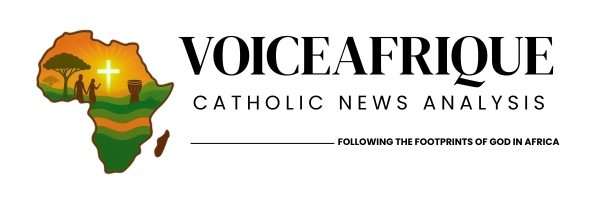Reporting from the Kigali Convention Center – July 31, 2025
Kigali — At the Regina Pacis Church in Kigali, under the gaze of Mary, Queen of Peace, the 20th Plenary Assembly of the Symposium of Episcopal Conferences of Africa and Madagascar (SECAM) opened with a solemn Mass presided over by Cardinal Peter Appiah Turkson, Chancellor of the Pontifical Academies of Sciences and Social Sciences. His deeply stirring homily recalled a painful chapter in African and Church history while casting a hopeful vision for the future.
Preaching before an assembly of 13 cardinals, 102 bishops, 72 priests, 39 sisters, and over 300 lay members of Christ’s faithful, along with delegates from across Africa and beyond, Cardinal Turkson invoked the memory of the 1994 Rwandan Genocide—a tragedy that unfolded during the very year the First African Synod proclaimed the Church in Africa as the “Family of God.”
“Even at the close of that historic synod,” the senior Vatican prelate reminded the congregation, “Africa was experiencing both hope and heartbreak.” Reflecting on the Synod’s joyous celebration of the end of apartheid in South Africa, he soberly added, “Yet that same year witnessed the horrific genocide in Rwanda, the very land where we are gathered today.”
It was a poignant moment. The silence in the basilica echoed the grief of a continent still wrestling with the wounds of conflict, war, and injustice. With pastoral sensitivity and theological depth, Cardinal Turkson named a painful truth that continues to haunt the African Church: “We once failed the Lord in the land, Rwanda.”
But the homily was far from a lamentation alone. It was a call to conversion—personal, ecclesial, and continental. Drawing inspiration from the Gospel account of the disciples meeting the Risen Christ in Galilee, the Cardinal likened the SECAM Assembly to a similar gathering—a people summoned by the Risen Lord and sent forth with a renewed mission.
“If this message is vital for salvation,” he challenged the assembly, “how will people hear it unless someone is sent to proclaim it?”
At the heart of his homily were two interconnected messages: a reaffirmation of the African Church’s identity as the “Family of God” and a call to recommit to the Gospel of reconciliation, justice, and peace.
Turkson urged African bishops and pastoral agents to reclaim the bold ecclesial vision born out of the 1994 synod. That vision—of the Church as a family rooted in communion, mutual care, and responsibility—remains as urgent today as ever. But it cannot be sentimentalized. It must be lived in truth, justice, and healing.
“To live as the Church-Family of God,” Turkson said, “is to be in right relationship with God and with one another. It means recognizing God as our Father, the Church as our Mother, and each other as brothers and sisters.”
That familial identity, he warned, imposes a moral and spiritual obligation on African Christians to confront the fractures within their communities, nations, and even within the Church. It calls for a spirituality of reconciliation rooted in the Paschal mystery—the life, death, and resurrection of Christ who heals all wounds.
The Cardinal recalled the legacy of Pope John Paul II, who initiated the idea of a Second African Synod centered on healing the wounds of conflict. Although John Paul II died before realizing this dream, his successor, Pope Benedict XVI, brought it to fruition in 2009 with the Second Synod for Africa, themed “The Church in Africa at the Service of Reconciliation, Justice, and Peace.”
Now, Cardinal Turkson urged SECAM to return to that vision—with renewed urgency. “Because we are human, and we often hurt one another,” he said, “we are constantly in need of healing and mending our relationships.”
In this way, the SECAM Plenary is not merely a conference but a liturgical and ecclesial moment—a mountain of encounter, like Galilee, where Christ once met his hesitant yet faithful disciples. Here too, the Risen Lord comes to his African Church—wounded, hopeful, and ready to be sent anew.
Turkson emphasized that reconciliation must not remain a vague ideal but must take flesh in concrete actions—restoring relationships, confronting injustice, and building peace in families, dioceses, communities, and nations.
“Reconciliation allows us to heal broken bonds,” he said, “and through that healing, we are called to live justly and in peace.”
In this Jubilee Assembly, SECAM is charting a new path for the Church in Africa from 2025 to 2050. At its foundation, Turkson emphasized, must be the recognition that Africa’s wounds are also the wounds of the Church—and healing them is an essential part of its mission.
As he concluded, Cardinal Turkson prayed that the Eucharist celebrated at the heart of this assembly would nourish all present with the grace to become “servants of reconciliation, justice, and peace.”
In Kigali—a city that once bore the scars of genocidal violence but now rises as a symbol of resilience and renewal—the words rang with prophetic urgency. The Church in Africa, Turkson affirmed, must not only remember its past but rise to the demands of the present.
“We once failed the Lord in Rwanda,” he said in essence. “Let us not fail Him again.”


1 comment
This i think is a sure way of getting some vital info concerning the church in Africa. Thanks!